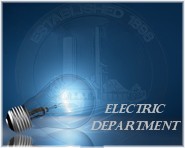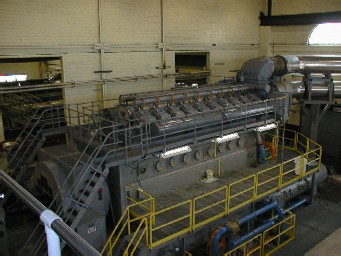Saving energy and money at work and at home
When thinking about conservation, there are two basic questions to answer. First, what technological changes can be made at your home or organization? Second, what behavioral changes can be made? Using advances in technology typically get a bigger energy savings, so think about changing out incandescent lights for fluorescent ones or buying a more efficient air conditioning unit.
But don't discount the multitude of small, easy energy-saving actions that every resident can take. These add up for big savings.
A list of tips to help you save energy, both at work and at home:
Lighting Tips:
-
Replace incandescent bulbs with
Compact Fluorescent Lights (CFLs).
CFLs use 75% less energy and last 8 to 10 times longer than incandescent lights making them worth the extra up-front cost. BUT, use CFLs appropriately - place them in fixtures that remain on for at least 3 hours daily. Special CFLs are required to operate with dimmers or 3-way switches. 
- Turn
off lights!
- Incandescent lights should always be turned off when not in use. Fluorescent lights work optimally when they are not turned off repeatedly, so only turn off when you plan to be away for 30 minutes or more.
- When day lighting is adequate.
- Leave minimal lighting on during non-business hours or when you are away from your home as necessary for safety; otherwise, shut off all lighting.
- Use
the right amount of light:
- Consider three-way lamps and dimming switches. This will make it easier to keep lighting levels low when brighter lights are not necessary.
- Use one large wattage lamp rather than two small ones. Example: use one 100 watt rather than two 60 watts light bulbs.
- Use task lighting (table and desktop lamps) instead of room lighting.
- Keep light fixtures, shades and bulbs clean!
Heating Tips:
- Turn down the thermostat. Wear warm clothing and set the thermostat to 68 degrees or lower during the day and evening, health permitting.
- Put extra blankets on the bed.
- Roll up towels and put them at the bottom of doors to stop drafts.
- On sunny days, keep the shades, blinds and drapes open. At night, close curtains, draperies and blinds to keep the heat in.
- Close closet doors and doors to unused rooms.
- Use reversible ceiling fans to push warm air downwards and keep rooms warmer.
- Make sure your home is properly insulated and seal cracks with caulking.
- Consider installing ENERGY STAR® windows.
- Switch off heating when you are out of the house.
- Keep heating registers and air vents clear of obstacles and make sure you clean or replace furnace filters regularly.
- Keep outside heating units free from leaves or debris that may clog vents.
- Choose heaters with thermostat controls and programmable timers.
- Cover wall-mounted air conditioners with plastic film or an airtight cover.
- Close the fireplace damper after the fire is out.
- Do not use fireplaces while your central heating system in on.
Air Conditioning Tips:
- When you are away from home or work set the thermostat to 85 degrees.When home, set to 76-78 degrees, health permitting.
- Turn off central air conditioning 30 minutes before you plan to leave your home or office. The building will maintain a cool temperature for that time.
- Consider using ceiling or portable fans to circulate and cool the air.
- Choose air conditioning units with thermostat controls and programmable timers.
- Open windows and shades during the evening when it's cooler. Use blinds, shades, and awnings to keep the heat out.
- Turn off lights, TVs and computers when they are not being used. They make air conditioning work harder!
- Do not place lamps or TV sets near your air conditioning thermostat.
- Close off unoccupied rooms and shut their air conditioning vents; turn off room air conditioners in unoccupied rooms.
- Clean or replace air conditioner filters regularly.
- Keep outside air conditioning units free from leaves that may clog vents.
- Insulate the attic, outside walls, floors, and ducts. Seal cracks with caulking and weather strip around windows and doors.
- Consider installing a solar powered fan in the attic for adequate ventilation.
- Consider using an ENERGY STAR® air conditioning unit.
Cooking Tips:
- Use microwaves to defrost, cook, and re-heat food instead of an oven.
- Don't block microwave vents.
- Turn off coffee machines when not in use and use small appliances for small tasks, such as a toaster instead of an oven.
- Make sure the seals in the oven fit properly.
- Keep lids on pots when cooking. While baking, do not open the oven; consider using the light instead.
- Keep microwaves and ovens clean and well maintained to work most efficiently.
Dishwashing Tips:
- Only run dishwashers when they are full and use the economy cycle for everyday washing.
- Instead of using the drying cycle, stop the dishwasher, open the door and let dishes dry naturally. It takes more energy to dry dishes than to wash them.
- Use cold water to rinse dishes before loading them into the dishwasher.
- Wash dishes in the sink where possible.
Laundry Tips:
- Only run the clothes washer and dryer when fully loaded.
- When possible, use cold water to wash clothes.
- Clean the clothes dryer filter after each load.
- Spin clothes thoroughly before drying.
- Do not over-dry clothes; use minimum amount of time necessary to dry them.
- Dry lighter items together and heavy items together.
- Consider using ENERGY STAR® washing machines.
General Suggestions:
- Do laundry & dishes during off-peak energy hours. Summer peak energy hours are noon to 6:00 p.m.
- Use trees and landscaping for shading purposes.
-
 ENERGY
STAR® is the label given by federal
government to products that exceed
energy efficiency standards. To find
out more about ENERGY STAR®, visit
http://www.energystar.gov/ or
call 1-888-782-7937.
ENERGY
STAR® is the label given by federal
government to products that exceed
energy efficiency standards. To find
out more about ENERGY STAR®, visit
http://www.energystar.gov/ or
call 1-888-782-7937. - Conservation works! Your efforts will save you money and will help Rockville Centre get through an energy crisis.
Useful Telephone Numbers:
- Electric Emergency (24 hour): 766-5800.
- Electric Department: 516-678-9357.



